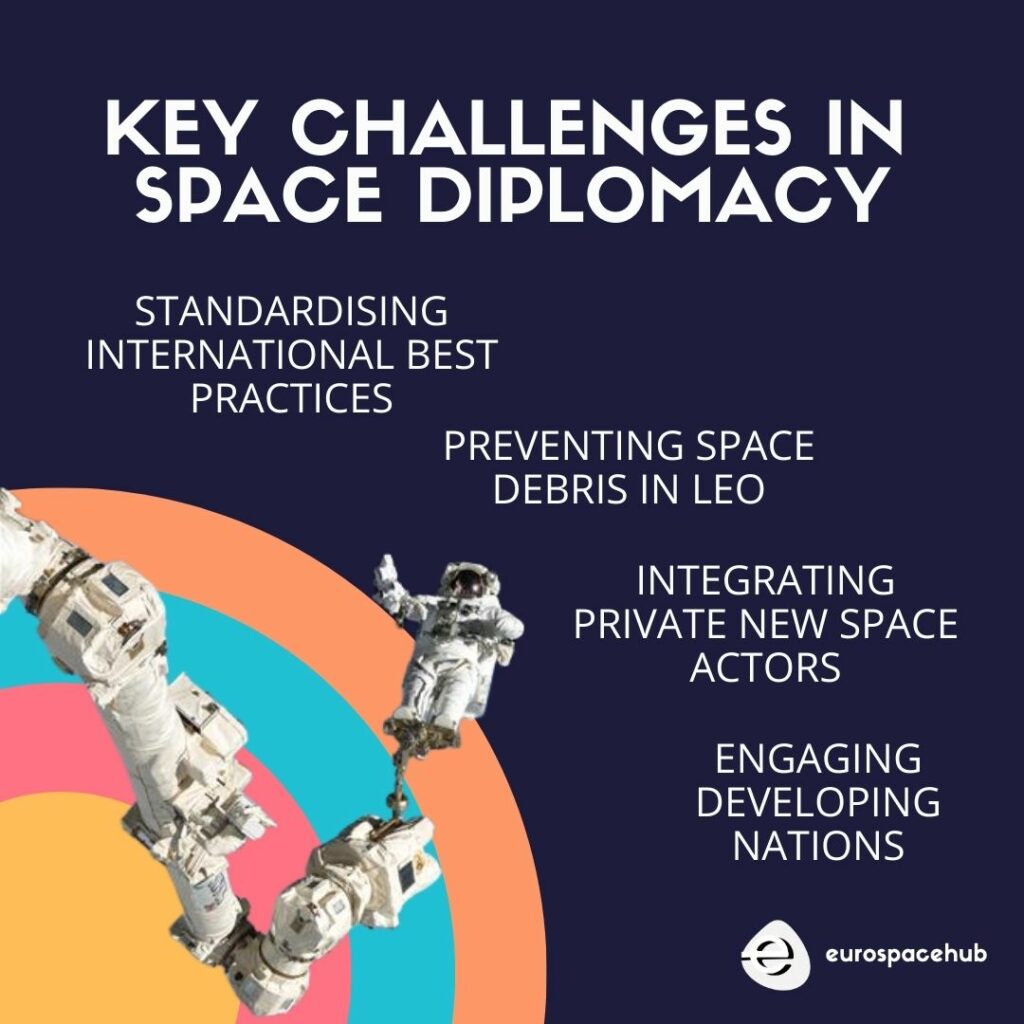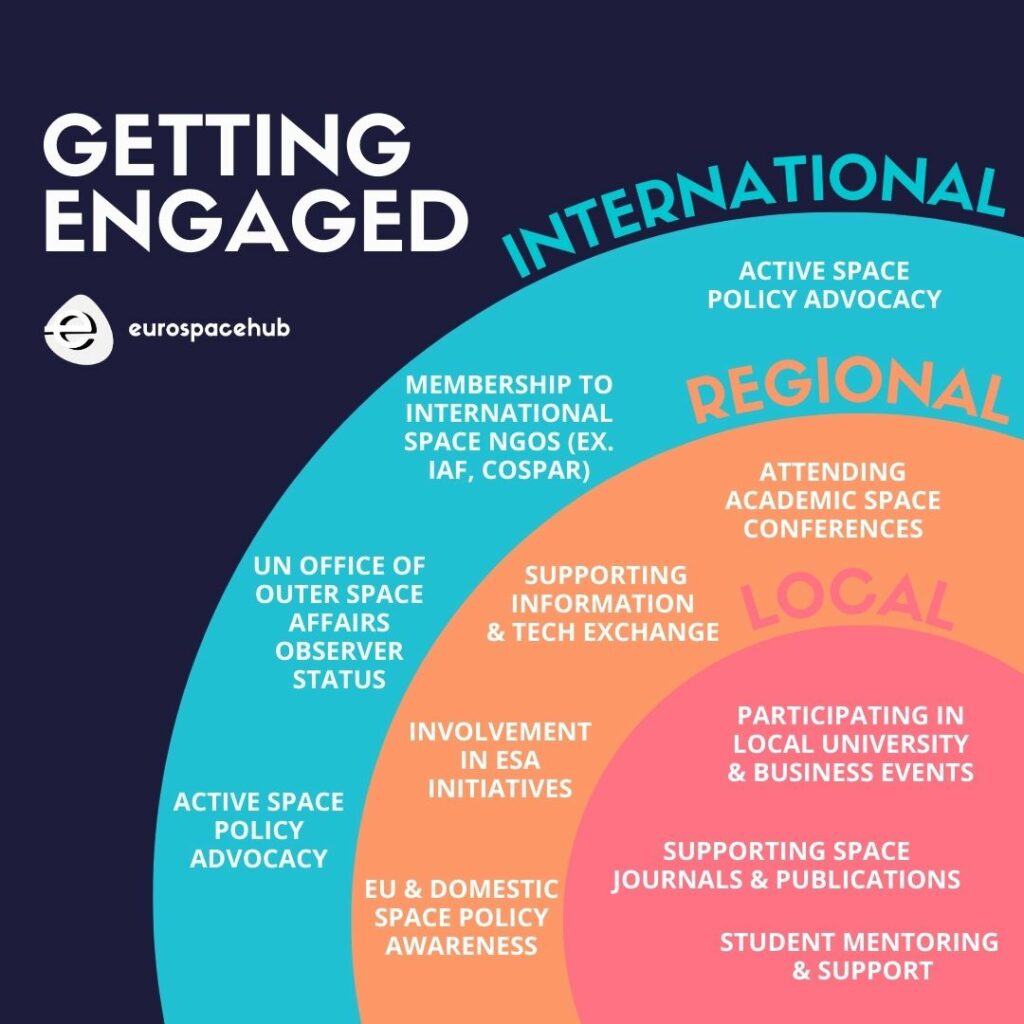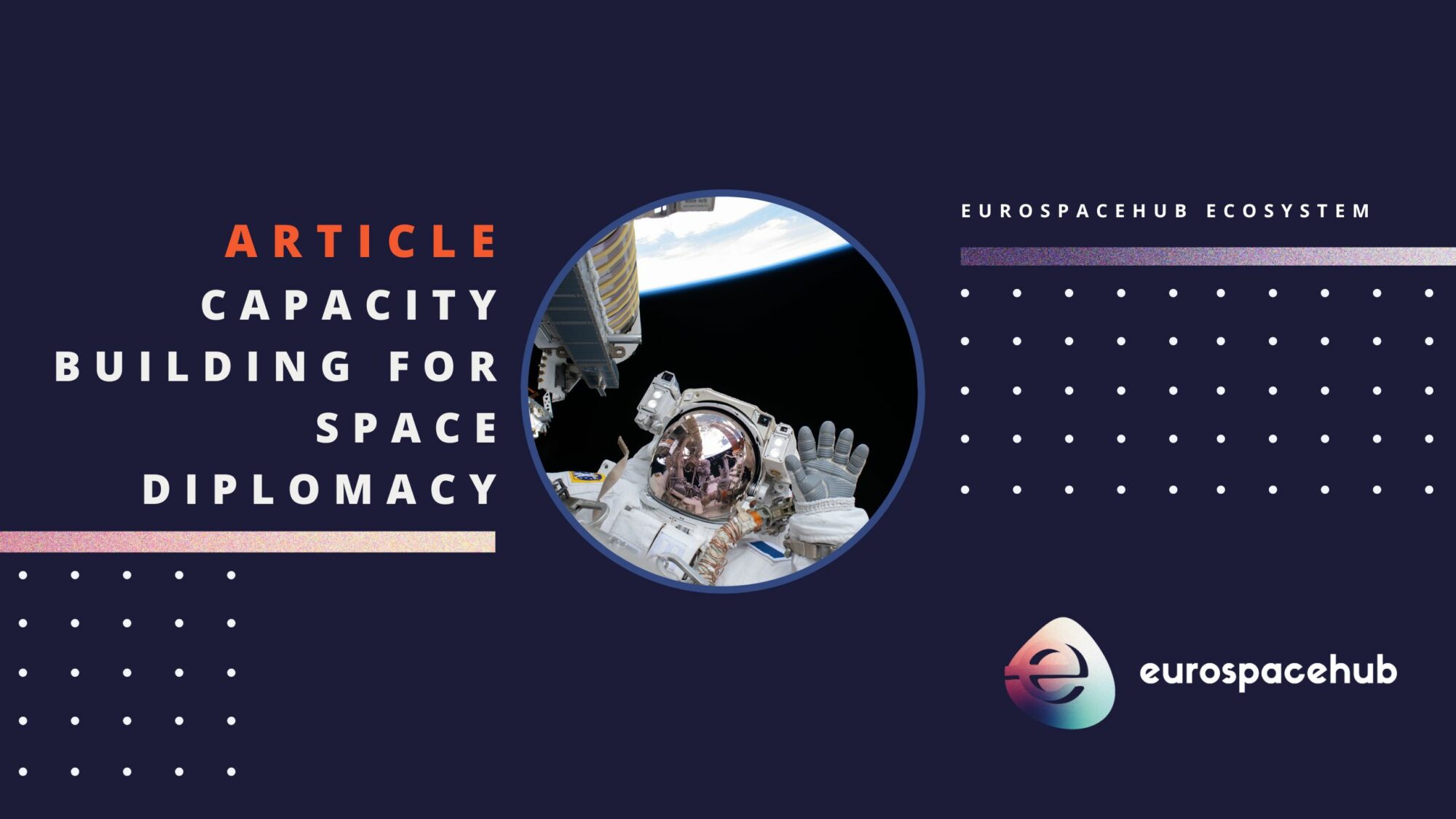In an era where global challenges demand collective efforts, the role of scientific diplomacy in fostering international cooperation to address complex issues related to outer space exploration has become increasingly vital. Nowhere is this more evident than in the European space ecosystem, where scientific research, technological innovation, and space exploration have the potential to unite nations and transcend geopolitical boundaries and administrative roadblocks. EuroSpaceHub is dedicated to connecting European space professionals building their capacity to implement scientific cooperation across borders, which is why this article will give you an outline of the stakeholders, spaces, and mechanisms of scientific diplomacy in the space sector.
The Landscape
The landscape of outer space diplomacy today is undergoing a massive transformation with regards to the capabilities of spacefaring entities as well as the number and types of stakeholders now involved in space. With the invention of Cubesats at the beginning of the 21st century, actors beyond public agencies with multi-billion Euro budgets could begin to research and develop relatively affordable but effective technologies to expand the private and commercial use of space for telecomunciations, geonavigation, earth observation, security servicing, and more. This transformation, often called the ‘New Space’ movement, diversifies the stakeholders in space, who now all generally fall under one of the umbrellas of governments, public space agencies, international and national research organisations, private companies, and universities. It is important to note that unlike many other sectors, all actors can participate in some capacity in the diplomatic processes that set general rules and norms for research, testing, launching, and conducting activities in space. This process is called scientific diplomacy, which is the use of scientific collaborative projects among nations to address common problems or goals and construct international partnerships.
Professional diplomatic actors regularly exchange dialogue in specific forums dedicated to space politics such as the UN Office of Outer Space Affairs’ Committe on the Peaceful Uses of Outer Space (COPUOS) and the Committee on Space Research (COSPAR) at the international level or at the EU-level, events like the European Space Forum or regulatory bodies the EU Agency for the Space Programme and EU Commission. Non-professional actors like researchers, entrepreneurs, etc. effectuate scientific diplomacy primarily through technology and data transfers, international academic conferences and publications, student and professional training exchanges, and cross-border cooperation on scientific projects or businesses.
Some of today’s key issues to address include the integration of ‘New Space’ private and commercial actors into the space ecosystem, the prevention and removal of space debris in Low Earth Orbit, counteracting light pollution, and agreeing on cohesive standards for best practices at the international level. The European Space Agency (ESA) has outlined its key priorities for the 2025 Agenda, emphasizing five main areas. Firstly, ESA aims to strengthen its relationship with the European Union (EU), recognizing the importance of collaboration between the two entities. Secondly, the agency intends to promote and accelerate the commercialization of green and digital initiatives within the space industry, acknowledging the significance of sustainable practices and technological advancements. Thirdly, ESA plans to focus on developing space capabilities related to safety and security, ensuring that space activities contribute to the overall well-being and protection of Earth and its inhabitants. Fourthly, the agency aims to tackle critical challenges within its programs, addressing any issues or obstacles that may arise in the pursuit of its objectives. Lastly, ESA seeks to complete its transformation, likely referring to organizational or operational changes that will enhance its effectiveness and efficiency in achieving its goals.
Space Diplomacy in Practice
For the purposes of this article, we will focus on scientific diplomacy as the primary pathway to effective international collaborations accessible to the vast majority of the space sector. The mechanisms of scientific diplomacy can be categorized into two main areas; The first area involves collaboration in what we can consider to be ‘traditional’ space projects, meaning data and science sharing, technology and instrumentation development, analogue field missions, finances and project implementation, and materials and power technologies that together make up the diverse aspects of an exploratory probe like the James Webb Telescope or a communications satellite. These collaborative efforts are trusted by the scientific community, as designing innovative space missions and technologies in our modern context ‘takes a village’, and it is nearly impossible to succeed without leveraging the expertise and resources of different nations. The most successful testimony to these types of technical cooperations is the International Space Station, which has been an ongoing collaboration since the 1980s and has been a major tool for international access to space for experimentation. Another more modern example, ESA’s Orion satellite sources its various components of its probe from 11 different nations.
The second area of this niche of diplomacy involves the development of new non-technical projects that focus on expanding access to space for untapped communities. This includes initiatives aimed at capacity building in human resources, fostering entrepreneurship and business development within the space industry, promoting peaceful cooperation among nations, harnessing humanistic and artistic resources for space-related activities, and striving for inclusivity through initiatives like ‘Space4All’. These endeavors seek to democratize and broaden the benefits of space exploration to stakeholders in humanities, arts, business, management, and more.

How You Can Get Involved
Space diplomacy is not just for diplomats! Any space professional has the potential to participate in international, multidisciplinary, and cross-sectoral collaborations and pave new pathways for scientific diplomacy. It is important to stay engaged with space politics, because diplomacy and policy set the boundaries and roadmap for where space use and exploration can go in all sectors.
EuroSpaceHub encourages all members of the space sector to explore the various avenues of traditional and scientific diplomacy. At the local level, it is easy to participate in local university and entrepreneurship events, support students through mentoring and training, and staying informed about space-related policies, initiatives, and developments by following reputable space journals and publications. At the European/regional level, it is important to support information and technology transfer offices and services, get involved in ESA or agency initiatives and forums, and participate in academic space conferences. Finally, at the international level it is easy to engage in large-scale non-governmenatl organisations like the International Astronautics Federation (IAF) or the Commitee on Space Research (COSPAR) to share perspectives and learn from experts and fellow enthusiasts, or via the United Nations as an observer of the UN Committee on the Peaceful Uses of Outer Space or other UNOOSA events. By taking these steps, space professionals from all corners of the sector can actively engage with outer space diplomacy and policy, helping shape the future of space exploration and cooperation.

ABOUT EUROSPACEHUB
EuroSpaceHub is a group of 5 founding members, VilniusTECH, International Space University, Complutense University Madrid, Lunex Foundation and Collabwith Group.
EuroSpaceHub aims to connect digitally the space ecosystem in Europe, from tech transfer offices to industry, space accelerator networks, research centres, and other universities. The project will allow these actors to easily connect with financial opportunities from the Horizon Europe framework, the venture capital programme, and the InnovFin initiative. EuroSpaceHub will bridge the gap between academic institutions and industry using a collaborative mindset and entrepreneurship programmes inside the universities connected through tech transfer offices.

EUROSPACEHUB IS FOUNDED BY VILNIUSTECH, INTERNATIONAL SPACE UNIVERSITY, COMPLUTENSE UNIVERSITY OF MADRID, COLLABWITH, LUNEX FOUNDATIONS AND FUNDED BY THE EIT HEI INITIATIVE LEAD BY EIT MANUFACTURING & EIT RAW MATERIALS.

